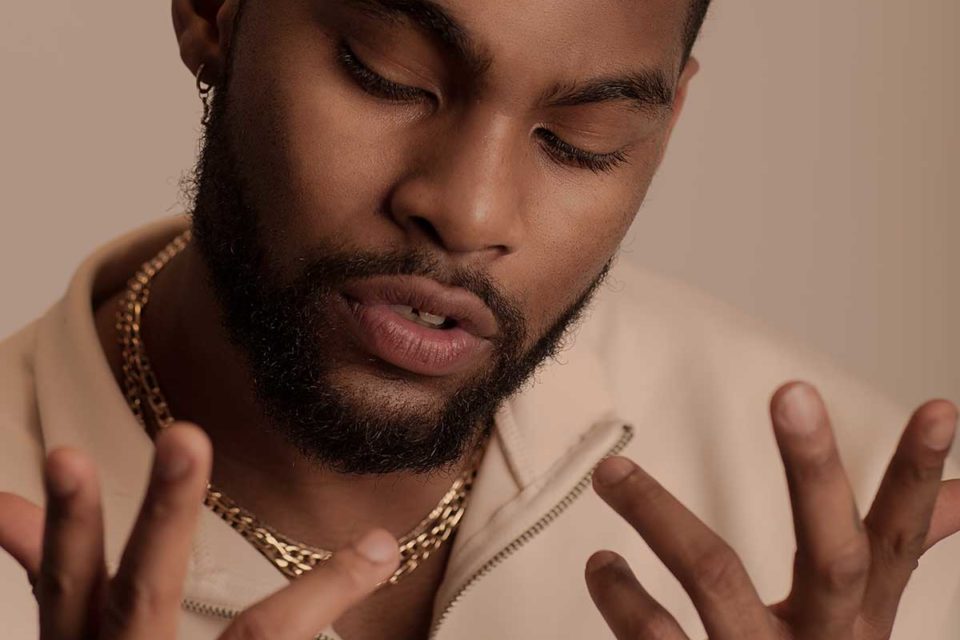Nashville native Bryant Taylorr is a suave and atmospheric singer, songwriter and occasional rapper that I’ve tracked since 2017, when he dropped his first serious project, the Juice EP, which was also a major introduction for the production work of Taylorr’s longtime friend, and WNXP’s July Artist of the Month, A.B. Eastwood.
I interviewed Taylorr a first time back then, to get a sense of the musical background he was bringing to his broody flavor of alternative R&B, then I followed up to find out how his publishing deal had changed things for him. Recently, I checked in once more by phone to get his up-close perspective on Eastwood’s ascendance as a community-building force and, most importantly, to talk about Taylorr’s plans for his first-ever solo headlining show at Exit/In on Aug 7.
Jewly Hight: What significance does headlining this show hold for you?
Bryant Taylorr: This is so big to me. I guess my last show that I ever did, that I put together myself, was just in a smoke shop. So I’ve always wanted to go a bigger venue for myself just to see what the turnout will be. And just to have my own show again, to see how that feels. So for me, it’s super significant, super, super big to me, to my team, to kind of see the growth over the last few years.
JH: We should place this in context: How far back does your experience playing music in front of people go? What did that look like early on when you were the kid behind the drum kit at church, and when you joined a boy band in your teens, toward the end of your time at Nashville School of the Arts? What did it look like back then?
BT: Oh, yeah, I [was playing] drums around churches and visiting different churches all of the time when I was really little, you know, 11, 12. That was like my first experience getting in front of people. And then I was in high school singing. We’d be going to different high schools, and that was my first time singing in front of anybody, especially being such a big crowd and they don’t know who you are. And after that, I was in the group [Contagious] and we were all around the country, but we were definitely doing shows in Nashville. We were only in bars and things like that. We were going to a lot of smaller venues, like different clothing shops and small businesses. We were just trying to get our hands on anything back then and moving from there to where I am now. I’ve stepped on every platform, but I’ve never stepped on a platform for me.
JH: You’re talking about the performing you’ve done with other people or as part of groups. After that, you became a solo act and you made your first project, Juice, with A.B. Eastwood. Together, you were zeroing in on a sound slightly to the alternative side of R&B, with glacial beats and hazy vocal layers drifting through. What was it like working with A.B. to figure out how to translate your sound to the live stage for the first time?
BT: We wanted to give vocoders and things like that. We wanted to really alter our sound on stage and we still haven’t really maximized our potential on it. We’ve taken Juice and really elevated that at this point to where I know how to do a lot of things with my voice now that I just practiced back then. I would find a weird beat that [A.B.] had and that would be something that would throw him off. Like, “That’s what you want to do?” And that has transformed to the stage
JH: I saw you perform at The Groove on a tiny outdoor stage on Record Store Day not too long ago. You had a pretty minimal setup that day. It was just you and A.B. up there as your DJ and hype man. What will it look like for you to present this show with scaled-up production, you know, to be able to do it the way you want to do it?
BT: It’s just going to take that up to another level. We love doing it with just two people, because you don’t want to depend on a lot of people every time you get on stage. So just making sure that we’re really just gearing on that, to where we’re extremely good at it, and adding in pieces isn’t hard at all. Like, it only makes it better. It’s like, “Oh, my goodness, you got synthesizers and you have pianos and you have a drummer and you have a background singer now.” So what we do already is only going to take it to the next level. It’s going to be crazy.

